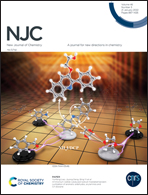A peptidomimetic-based thixotropic organogel showing syneresis-induced anti-adhesion against water and ice†
Abstract
The self-assembly, organogelation, syneresis, and anti-adhesion properties of a peptidomimetic containing L-phenylalanine and 2,6-dimethylpyridine 3,5-dicarboxylic acid have been studied in detail. The peptidomimetic forms a transparent gel in aromatic solvents such as benzene, toluene, xylene and chlorobenzene. The hierarchical nature of the self-assembly process in the gel was characterized by a combination of POM and FE-SEM imaging, revealing an entangled fiber network. The rheology measurements then confirmed the formation of a thixotropic organogel. The storage modulus was about one order of magnitude higher than the loss modulus, which indicates the physical crosslinking in the organogel. The gel exhibits significant self-healing properties and allows diffusion of rhodamine 6G through the gel matrix. The peptidomimetic gel shows syneresis under an appropriate environment. The peptidomimetic organogel surfaces exhibit syneresis-induced anti-adhesion properties against ice and water. This peptidomimetic gelator molecule, being economically viable and easy to synthesize, has great prospects in materials chemistry.



 Please wait while we load your content...
Please wait while we load your content...